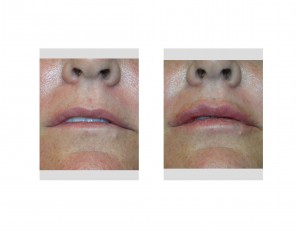
With well over a dozen injectable filler options of different chemical compositions, complications can occur and the occurrence does differ based on the injectable filler type. The hyaluronic-acid based fillers occupy the largest number of available inbjectable filler materials because it has proved to be far superior to any collagen-based material in terms of its duration of effects and low incidence of inflammatory and aesthetic problems. Particulated fillers, that contain resorbable nor non-resorbable materials, do have a slightly higher risks of complications but it is generally believed to be only marginally higher.
In the online March 2013 issue of the Facial Plastic Surgery journal, a study was published that evaluated the incidence of complications from injectable soft tissue filler treatments. The study results were based on over 2,000 injected patients over a five year period, half of which were done with hyaluronic acid-baed fillers. The other half consisted of a mixture of Radiesse and Sculptra. Typical and self-limiting problems such as swelling and bruising were not counted as complications. Complications consisted of nodules or granulomas, cellulitis (infection) and skin necrosis. The total number of injectable complications were 14 or 0.7%.
Based on the material composition of the injectable filler, complication rates differed. Hyaluronic-acid based fillers had the lowest (0.2%), a slightly higher rate with Sculptra (0.7%) and Radiesse with the highest. (2.6%) While the authors admitted that patients with injected complications may have been missed, my experience is that patients who developed any of these skin complications would be highly unlikely to not let their injector know.
Injectable fillers offer a very valuable and versatile option for facial rejuvenation. Of their many benefits is that few significant complications occur with their use and this current study supports that well known perception. But in the search for longer-lasting results, the particulated fillers are associated with a significantly higher number of serious complications because they leave behind more reactive substances. Keeping these complications low undoubtably requires a more skilled and experienced injector.
Dr. Barry Eppley
Indianapolis, Indiana


